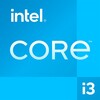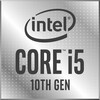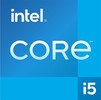Intel Core i3-1220P vs Intel Core i5-1035G7 vs Intel Core i5-1250P
Intel Core i3-1220P
► remove from comparison
The Intel Core i3-1220P is a lower mid-range Alder Lake family SoC designed for use in ultra-light, ultra-thin laptops of the more affordable flavour. It was announced in early 2022 and it has 2 performance cores as opposed to the 6 cores of the top-of-the-line i7-1280P (P-cores, Golden Cove architecture) mated to 8 efficient cores (E-cores, Gracemont architecture). The i3's P-cores are Hyper-Threading-enabled for a total of 12 threads when combined with its E-cores. The clock speeds range from 1.5 GHz to 4.4 GHz for the performance cluster and 1.1 GHz to 3.3 GHz for the efficient cluster. The shortcomings of this processor as compared with the faster Core i5-1240P are many, including the significantly slower iGPU, lower CPU core count, lower clock speeds, complete lack of the vPro features.
Architecture
The i3 is a continuation of Intel's efforts to use the ARM-developed big.LITTLE technology for its own benefit. A single "little" Alder Lake core is supposed to be as fast as a Skylake core (as found in the venerable Core i7-6700HQ among other options) which is six years old at this point. All of Core i3-1220P's CPU cores enjoy access to 12 MB of L3 cache. The integrated memory controller supports various memory types up to LPDDR5-5200, DDR5-4800, LPDDR4x-4267 or DDR4-3200; Intel suggests using no more than 64 GB of RAM, for reference. Just like the other 12th Gen Intel Core processors, this Core i3 comes with the Thread Director which is a new functionality designed to help Windows 11 decide which cores to use for what workload for best performance and efficiency possible. Hardware acceleration of AI algorithms is supported via GNA 3.0 and DL Boost (via AVX2). PCI-Express 5.0 support has not found its way into Alder Lake P processors, so users will have to be content with PCI-Express 4.0 for the time being. Four PCI-Express 4 lanes allow for a read/write rate of up to 7.9 GB/s, provided a suitably fast NVMe SSD is used.
Please note that this is not a user-replaceable CPU. It gets soldered permanently on to the motherboard (FCBGA1744 socket interface).
Performance
While we have not tested a single system built around the 1220P as of October 2023, we have tested a laptop featuring the i5-1240U, a chip with nearly the same specs (2 P-cores mated to 8 E-cores, all running at the same clock speeds as what the 1220P has). Based on that, we expect the 1220P to be just slightly ahead of the Core i5-11400H, the Core i7-1265U and also the Ryzen 5 5600U, as far as multi-thread benchmark scores are concerned. Your mileage may vary depending on how high the CPU power limits are and how competent the cooling solution of your system is.
Graphics
The built-in graphics adapter in the form of the 64 EU UHD Graphics running at up to 1.1 GHz is a slightly downgraded 80 EU Iris Xe. The latter can be found in many Alder Lake-P and Tiger Lake-UP3 processors, like a Core i5-1250P or a Core i5-1145G7, respectively. Despite the lower EU cluster count, this is still a fairly capable iGPU, loaded with modern features such as the AV1 video decoding capability and SUHD 4320p monitor support. The UHD Graphics will happily drive up to 4 monitors simultaneously, provided the laptop has the outputs required. Its gaming performance is unlikely to please the crowds, though, as it will be good for resolutions no higher than 1600x900 and Low settings only in most titles trleased in 2021 and 2022. Your mileage may vary depending on how high the Power Limits are and how capable the cooling solution of a laptop is. Fast RAM is a prerequisite for decent performance as well (the UHD Graphics has to make do with no dedicated video memory).
Power consumption
The i3's base power consumption (also known as the default TDP or Power Limit 1) is 28 W; its "minimum assured" power consumption sits at 20 W. In the meantime, the maximum Turbo power consumption (also known as the PL2) is not supposed to exceed 64 W.
This 12th generation Intel chip is built with Intel's fourth-gen 10 nm process marketed as Intel 7 for decent, as of late 2022, energy efficiency. Expect the i3 to be significantly less power-hungry (and a lot easier to cool) than all other Alder Lake-P chips because of its lower core count.
Intel Core i5-1035G7
► remove from comparison
The Intel Core i5-1035G7 is a power efficient quad-core SoC for laptops and Ultrabooks based on the Ice -Lake-U generation that was announced in Mai 2019 (Computex). It integrates four Sunnycove processor cores (8 threads thanks to HyperThreading) clocked at 1.2 (base) - 3.7 (single core Turbo) GHz. 2 cores can reach 3.6 GHz and all four 3.3 GHz using Turbo Boost. According to Intel the Sunnycove cores achieve 18% more IPCs (Instructions per Clock). The Core i5-1035G7 is the second fastest Ice Lake-U chip at the time of announcement in 2019.
The biggest improvement for Ice-Lake is the integrated Gen 11 graphics adapter called Iris Plus Graphics. The Core i7-1065G7 integrates the biggest G7 variant with 64 CUs clocked at 300 - 1100 MHz. The Iris Plus G7 should be twice as fast as the predecessors and best the AMD Vega 10 GPU in current Ryzen APUs.
Other improvements for Ice Lake are the AI hardware acceleration and the partial integration of Thunderbolt and Wifi 6 in the chip. The integrated DDR4 memory controller supports modules with up to 3200 MHz (and LPDDDR4-3733).
Performance
The average 1035G7 in our database is in the same league as the Ryzen 3 4300U and the Core i5-10210U, as far as multi-thread benchmark scores are concerned. Which isn't bad at all as of late 2021. The Core i5-1035G4 and the Core i5-1035G1 are two other chips that nearly match the 1035G7 in multi-thread performance.
Thanks to its decent cooling solution and a long-term CPU power limit of 22 W, the Surface Laptop 3 13 is among the fastest laptops built around the 1035G7 that we know of. It can be at least 30% faster in CPU-bound workloads than the slowest system featuring the same chip in our database, as of August 2023.
Power consumption
This Core i5 has a default TDP (also known as the long-term power limit) of 15 W, a value that laptop manufacturers are allowed to change to anything between 12 W and 25 W if required with clock speeds and performance changing accordingly. Those values are a little too high to allow for passively cooled designs.
The processor is built with Intel's second-gen 10 nm process for decent, as of late 2022, energy efficiency.
Intel Core i5-1250P
► remove from comparison
The Intel Core i5-1250P is a mid-range Alder Lake-P family SoC designed for use in ultra-light, ultra-thin (yet actively cooled) laptops. It was announced in early 2022 and it has 4 performance cores, as opposed to the 6 cores of the top-of-the-line i7-1280P (P-cores, Golden Cove architecture) mated to 8 efficient cores (E-cores, Gracemont architecture). The i5's P-cores are Hyper-Threading-enabled for a total of 16 threads when combined with its E-cores. The clock speeds range from 1.7 GHz to 4.4 GHz for the performance cluster and 1.2 GHz to 3.3 GHz for the efficient cluster. The shortcomings of this processor as compared with the slightly faster Core i5-1260P include the smaller L3 cache, slower iGPU model, lower clock speeds. Full vPro feature set is enabled in the case of this i5, though ("Enterprise" tier, allowing for remote device management).
Architecture
The i5 is a continuation of Intel's efforts to use the ARM-developed big.LITTLE technology for its own benefit. A single "little" Alder Lake core is supposed to be as fast as a Skylake core (as found in the venerable Core i7-6700HQ among other options) which is six years old at this point. All of Core i5-1250P's CPU cores enjoy access to 12 MB of L3 cache. The integrated memory controller supports various memory types up to LPDDR5-5200, DDR5-4800, LPDDR4x-4267 or DDR4-3200; Intel recommends using no more than 64 GB, for reference. Just like the other 12th Gen Intel Core processors, this Core i5 comes with the Thread Director which is a new functionality designed to help Windows 11 decide which cores to use for what workload for best performance and efficiency possible. Hardware acceleration of AI algorithms is supported via GNA 3.0 and DL Boost (via AVX2). The alluringly fast PCI-Express 5.0 spec has not found its way into Alder Lake P processors, so users will have to be content with PCI-Express 4.0 for the time being. Four PCI-Express 4 lanes allow for a read/write rate of up to 7.9 GB/s, provided a suitably fast NVMe SSD is used.
Please note this is not a user-replaceable CPU. It gets permanently soldered on to the motherboard (FCBGA1744 socket interface).
Performance
The average 1250P in our database nearly matches the Ryzen 5 5500U and the Ryzen 5 PRO 6650U in multi-thread performance, trailing behind the Core i5-1240P just slightly. This is a great CPU for nearly all tasks imaginable, as long as one does not expect it to be as fast as the mighty Core i7-12700H.
Your mileage may vary depending on how high the Power Limits are and how competent the cooling solution of your system is. The latter is really important as a single Golden Cove core can eat more than 20 W when under heavy load.
Graphics
The built-in graphics adapter in the form of the 80 EU Iris Xe running at up to 1.4 GHz has seen little change from what was built into certain 11th Gen Tiger Lake UP3 processors, like a Core i5-1135G7, which is hardly a downside as this iGPU is loaded with modern features, AV1 video decoding capability and SUHD 4320p monitor support included. The Xe isn't a stranger to a bit of casual gaming; that said, your mileage may vary depending on how high the Power Limits are and how capable the cooling solution of a laptop is. Expect something close to NVIDIA's MX250 or in other words, acceptable framerates in most games when playing at 1080p / Low settings. Fast RAM is a prerequisite for decent performance as the Xe has to make do with no dedicated video memory.
Power consumption
The i5's base power consumption (also known as the default TDP or Power Limit 1) is 28 W; its maximum Turbo power consumption (also known as the PL2) is not supposed to exceed 64 W. As for the "Minimum Assured" power consumption, Intel's guidelines mention 20 W. All in all, an active cooling solution is a must for a CPU like this.
The i5-1250P is built with Intel's fourth-gen 10 nm manufacturing process marketed as Intel 7 for decent, as of late 2022, energy efficiency. Despite that, the i5 is more power-hungry than certain 7 nm U-class AMD Ryzen 5000 chips delivering similar, or even higher, performance.
| Model | Intel Core i3-1220P | Intel Core i5-1035G7 | Intel Core i5-1250P | ||||||||||||||||||||||||||||||||||||||||||||||||||||||||||||||||||||||||
| Series | Intel Alder Lake-P | Intel Ice Lake | Intel Alder Lake-P | ||||||||||||||||||||||||||||||||||||||||||||||||||||||||||||||||||||||||
| Codename | Alder Lake-P | Ice Lake-U | Alder Lake-P | ||||||||||||||||||||||||||||||||||||||||||||||||||||||||||||||||||||||||
| Series: Alder Lake-P Alder Lake-P |
|
|
| ||||||||||||||||||||||||||||||||||||||||||||||||||||||||||||||||||||||||
| Clock | 1100 - 4400 MHz | 1200 - 3700 MHz | 1200 - 4400 MHz | ||||||||||||||||||||||||||||||||||||||||||||||||||||||||||||||||||||||||
| L1 Cache | 928 KB | 192 KB | 1.1 MB | ||||||||||||||||||||||||||||||||||||||||||||||||||||||||||||||||||||||||
| L2 Cache | 9.5 MB | 2 MB | 10 MB | ||||||||||||||||||||||||||||||||||||||||||||||||||||||||||||||||||||||||
| L3 Cache | 12 MB | 6 MB | 12 MB | ||||||||||||||||||||||||||||||||||||||||||||||||||||||||||||||||||||||||
| Cores / Threads | 10 / 12 | 4 / 8 | 12 / 16 | ||||||||||||||||||||||||||||||||||||||||||||||||||||||||||||||||||||||||
| TDP | 28 Watt | 15 Watt | 28 Watt | ||||||||||||||||||||||||||||||||||||||||||||||||||||||||||||||||||||||||
| Technology | 10 nm | 10 nm | 10 nm | ||||||||||||||||||||||||||||||||||||||||||||||||||||||||||||||||||||||||
| max. Temp. | 100 °C | 100 °C | 100 °C | ||||||||||||||||||||||||||||||||||||||||||||||||||||||||||||||||||||||||
| Socket | BGA1744 | BGA1526 | BGA1744 | ||||||||||||||||||||||||||||||||||||||||||||||||||||||||||||||||||||||||
| Features | DDR4-3200/LPDDR4x-4266/DDR5-4800/LPDDR5-5200 RAM, PCIe 4, Thread Director, DL Boost, GNA, MMX, SSE, SSE2, SSE3, SSSE3, SSE4.1, SSE4.2, AVX, AVX2, BMI2, ABM, FMA, ADX, SMEP, SMAP, EIST, TM1, TM2, Hyper-Threading, Turbo, SST, AES-NI, RDRAND, RDSEED, SHA | DDR4-3200/LPDDR4-3733 RAM, PCIe 3, 4 GT/s bus, DL Boost, GNA, MMX, SSE, SSE2, SSE3, SSSE3, SSE4.1, SSE4.2, AVX, AVX2, AVX-512, BMI2, ABM, FMA, ADX, VMX, SMEP, SMAP, EIST, TM1, TM2, HT, Turbo, SST, AES-NI, RDRAND, RDSEED, SHA, SGX | DDR4-3200/LPDDR4x-4266/DDR5-4800/LPDDR5-5200, PCIe 4, Thr. Director, DL Boost, GNA, Remote Platform Erase, MMX, SSE, SSE2, SSE3, SSSE3, SSE4.1, SSE4.2, AVX, AVX2, BMI2, ABM, FMA, ADX, SMEP, SMAP, EIST, TM1, TM2, HT, Turbo, SST, AES-NI, RDRAND, RDSEED, SHA | ||||||||||||||||||||||||||||||||||||||||||||||||||||||||||||||||||||||||
| iGPU | Intel UHD Graphics 64EUs (Alder Lake 12th Gen) ( - 1100 MHz) | Intel Iris Plus Graphics G7 (Ice Lake 64 EU) (300 - 1050 MHz) | Intel Iris Xe Graphics G7 80EUs ( - 1400 MHz) | ||||||||||||||||||||||||||||||||||||||||||||||||||||||||||||||||||||||||
| Architecture | x86 | x86 | x86 | ||||||||||||||||||||||||||||||||||||||||||||||||||||||||||||||||||||||||
| Announced | |||||||||||||||||||||||||||||||||||||||||||||||||||||||||||||||||||||||||||
| Manufacturer | ark.intel.com | ark.intel.com | ark.intel.com |


 Deutsch
Deutsch English
English Español
Español Français
Français Italiano
Italiano Nederlands
Nederlands Polski
Polski Português
Português Русский
Русский Türkçe
Türkçe Svenska
Svenska Chinese
Chinese Magyar
Magyar